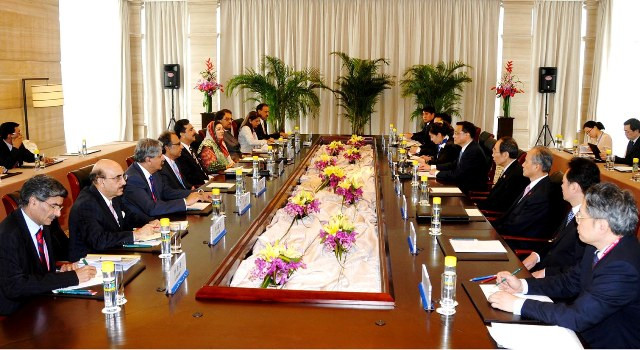Analysing Boao: It’s the economy, stupid
PM Gilani advised to focus on economy to ride out of current socio-economic crisis.

Chinese Vice-Premier Li Keqiang on Monday opened Boao Forum for Asia Annual Conference 2012 China with a vow to deepen reforms and pursue a cooperative, all-inclusive model of national growth and regional cooperation.
Delivering his keynote speech to several hundred government, business and academic leaders from around the globe attended the meeting, themed “Asia in the Changing World: Moving toward Sound and Sustainable Development,” in Boao, Li reminded participants of the grave challenges that Asia faces in the years ahead, ie, food and energy security, as well as the need to balance growth with sustainable development.
“Faced with profound changes in international and domestic landscapes, we must let reforms and opening-up continue to lead the way in removing institutional obstacles that hamper the shift of the growth model,” Li said.
The Boao Forum, a China-led Asian equivalent of the prestigious World Economic Forum held annually in Davos, draws government and business leaders as well as academia in Asia and other continents to share experiences and visions on challenges arising out of development and urbanisation.
“We do not seek hegemony but want all to benefit from the fruits of sustainable development,” declared Li, while proudly flagging the big strides China has made to become the second largest economy. Li, set to become the prime minister later this year, also reaffirmed a commitment to goals of people-friendly development and regional cooperation.
Besides Li, Prime Minister Yousaf Raza Gilani was among the three prime ministers invited to speak at the session. In his eight-minute address, the prime minister enumerated his government’s achievements since 2008, and reiterated that the economy was fragile and reeling from the shock of high oil prices.
However, he underlined, his government was pursuing a new growth strategy that centres on preservation of economic stability, incentives for private investment, and several initiatives for deepening relations with countries such as China. Trade and tariff liberalisation with China, a transit trade agreement with Afghanistan, and most favoured nation status (MFN) for India were also part of this new strategy.
The premier also flagged Pakistan’s independent judiciary and a free media as big steps forward in the country’s democratic transition. This message about the fruits of democracy may have gone down well with his Italian counterpart Mario Monti and several business executives, but probably not with his hosts as well as the Kazakh premier Karim Massimov. Both countries, while absorbingly focused on economic progress, expansion and consolidation, are politically still in the clutches of single-party rule, perpetuated by an oppressive legal-administrative regime that is authoritarian in nature if judged against western ideals.
The Chinese vice-premier reiterated his country’s dedication “to creating an open, transparent, fair, competitive and predictable marketplace and legal environment,” and ending protectionist policies – but many business executives and economists take exception to such commitments, saying transparency and subsidies remain big question marks in a country that is beginning to display problems with growing food and energy needs besides the fall-out of rapid urbanisation.
Yet, it is a country that is striving to improve livelihoods, remove, or at least minimise, the disparity between urban and rural regions, struggling to ensure quality social housing and trying to regulate income distribution.
Despite the deficit in democratic practices, China’s astounding growth continues to attract foreign investment in billions – its reserves hovering above a whopping four billion dollars. It was against this backdrop that Italian Prime Minister Mario Monti delivered a passionate appeal to China: Will Chinese companies and government entities put more financial and industrial investments in Italy?
He said he flew to Asia with this objective, and to urge Chinese investment in Italy and elsewhere in Europe to help ease the Euro-Zone’s financial crisis.
The Boao Forum, held every year in this scenic town in South China’s island province of Hainan, not only showcases the breath-taking growth in China but also epitomises this mammoth country’s desire to take the lead in the new global economic order. In the same breath, it also attempts to allay fears of China’s pursuit of geo-strategic hegemony.
The Hainan province is a largely rural, farming region with little significant industry. Because of its natural beauty and absorbing coastline, the authorities are trying hard to turn it into a tourist attraction. The Hainan Airline counts among the best, and is the only five-Star Chinese carrier.
Much of the discourse that has taken place at successive Boao Forums, particularly the Chinese presentations, bear a telling lesson for Pakistan: put politically contentious issues at the back-burner and fix the economy. Therein lies the real sovereignty.
Chinese leaders conveyed this message to Premier Gilani in the latest round bilateral meetings too.
Vice-Premier Li advised that we focus on economy to ride out of our current socio-economic crisis, Gilani told The Express Tribune before leaving back for Islamabad. We will pursue the Chinese advice very seriously as part of our “Look East Policy”, he said.
Published in The Express Tribune, April 3rd, 2012.



















COMMENTS
Comments are moderated and generally will be posted if they are on-topic and not abusive.
For more information, please see our Comments FAQ